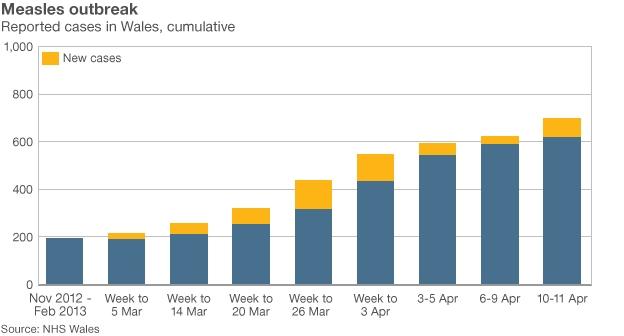Swansea measles epidemic: Confirmed cases jump to 693
- Published
Another 73 cases bring the total to 693, with health officials warning still not enough children are coming forward for MMR jabs.
There as been a big jump in measles cases reported in the Swansea epidemic over the past two days, says Public Health Wales (PHW)
Another 73 cases bring the total to 693, with health officials warning still not enough children aged 10 to 17 are coming forward for MMR jabs.
Health officials have also raised concerns about the number of measles cases in Powys.
More drop-in clinics are taking place this weekend.
"We remain extremely concerned this outbreak is showing no signs of going away," said Dr Marion Lyons, of PHW.
The total number of cases in the outbreak centred on the Swansea area is now 693, up from 620 reported on Tuesday.
More than 1,700 people received MMR jabs at special drop-in clinics in Swansea, Neath Port Talbot and Bridgend last weekend. Another 900 were vaccinated in the Swansea area last week.
However, Public Health Wales (PHW) has warned that despite those immunisations the outbreak has not been brought under control.
At least 6,000 children have still not had the MMR (measles, mumps, rubella) vaccine in the Swansea area.
Public Health Wales has also raised concerns about an increasing number of cases in Powys, with 50 reported in the Welshpool area.
'Extremely concerned'
The Swansea outbreak began last November and health officials say it shows no sign of abating.
More hospital drop-in clinics will be held in Morriston and Singleton hospitals in Swansea, Neath Port Talbot hospital and the Princess of Wales in Bridgend from 10:00 BST to 16:00 BST on Saturday.
They will target children and adolescents who did not have their scheduled MMR jabs as babies and toddlers.
PHW has said not enough children aged 10 to 17 are coming forward for the jabs, and have urged parents to get their children vaccinated through GPs.
Dr Marion Lyons, director of health protection for Public Health Wales, said: "With measles cases at almost 700, with 73 of those reported in the last two days alone, we remain extremely concerned that this outbreak is showing no signs of going away.
"We are delighted to see parents starting to arrange vaccination for their children but the numbers simply aren't high enough to bring the outbreak under control."
She said they have particular concerns about unvaccinated children aged 10 to 14.
Public Health Wales says it is inevitable that some of those vaccinated in the past week will already be incubating measles, and vaccination will not prevent them from becoming unwell. But their illness is likely to be milder than if they had not received the vaccine.
Dr Lyons added: "Measles cannot be taken lightly because you can never tell who will go on to develop the more serious complications of pneumonia or encephalitis [brain inflammation]. MMR vaccination offers the only protection against these complications."
Meanwhile, health officials in Cardiff and Vale of Glamorgan are planning to hold drop-in vaccination clinics at Cardiff Royal Infirmary and Llandough Hospital on Saturday as a "sensible precaution" in light of the epidemic in Swansea.
Dr Tom Porter, consultant in public health medicine, said: "We have not seen a local outbreak in the Cardiff and Vale area yet but it is important that children and teenagers have both [MMR] jabs given how serious the risks are from measles."
He estimated that around 13,000 children under 19 had not had two MMR jabs and were not adequately protected.

- Published10 April 2013
- Published9 April 2013
- Published4 April 2013
- Published6 April 2013